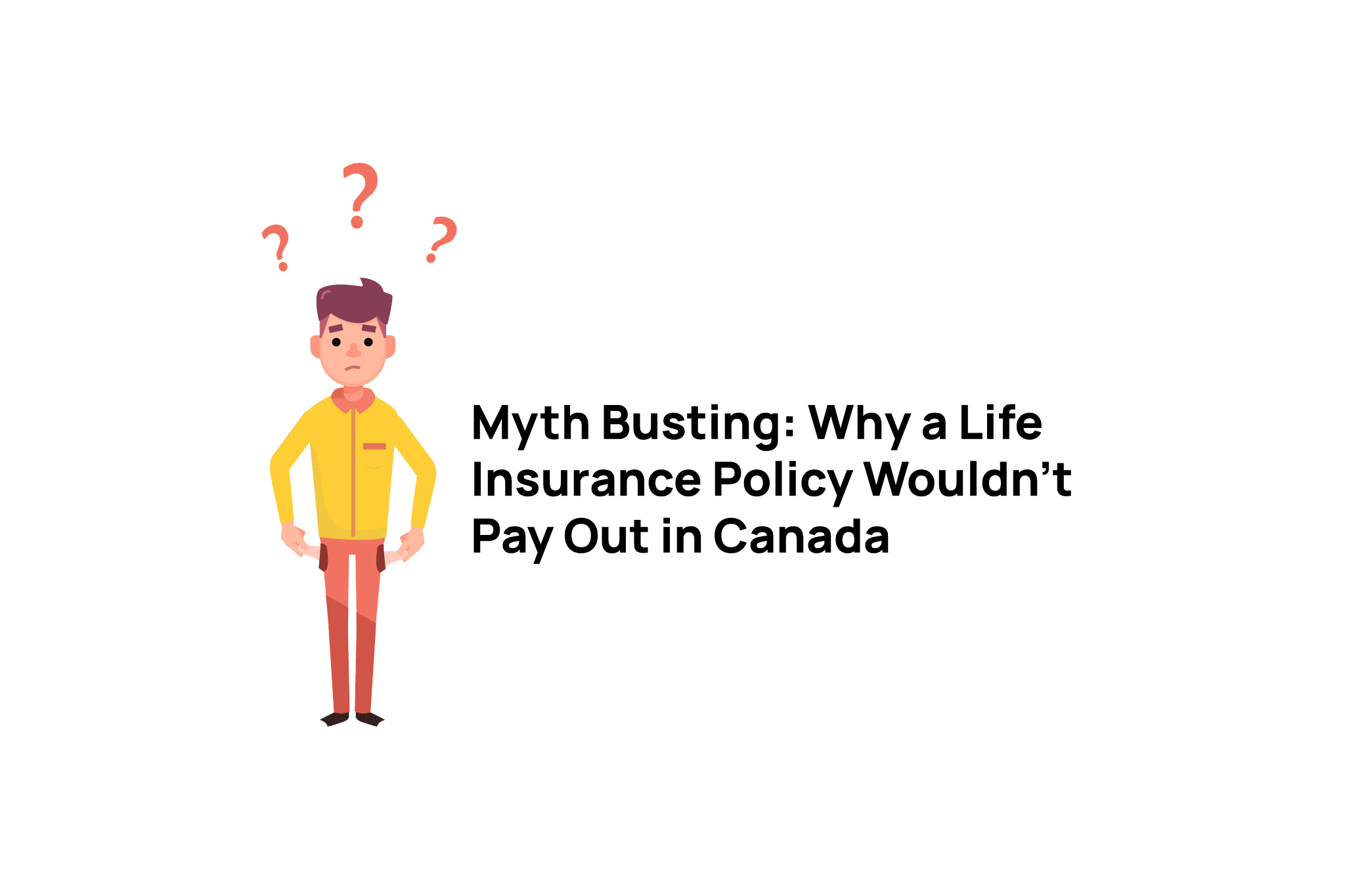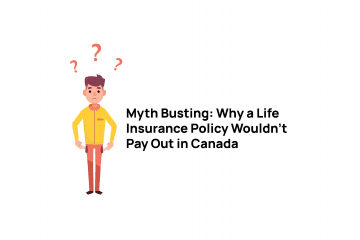As insurance advisors, we hear clients assume all the time that they can do something that will make it so that their life insurance policy won’t pay out. People assume that there are many loopholes that life insurance companies are looking to exploit so that they don’t have to pay out the death benefit on policies. I am here to assure you that this simply isn’t the case. In fact, it is very rare in Canada to have an in-force life insurance policy that does not pay out the death benefit. In most cases, the reasons that people are concerned that their life insurance policy would not pay out are based on some sort of misinformation that they have heard somewhere. To ease the confusion, we put together a list of circumstances under which your life insurance wouldn’t pay out so that you can understand facts from fiction.
In this article:
- I missed my Premium Payment. What Happens to My Policy?
- What if there’s a Mistake on my Application?
- What Are the Other Reasons that a Policy Wouldn’t Pay Out?
- The Bottom Line

I missed my Premium Payment. What Happens to My Policy?
Fact: Your policy needs to be in good standing and in force with the insurer. You also need to have premiums paid up to date in order for the death benefit to be paid out. What does this mean?
- In-Force – this means that the coverage cannot have expired. Remember that term insurance policies will have an expiry date built into them where the policy provides you with a set amount of coverage to a predetermined date in the future. If that date has passed, the policy has expired and won’t pay out.
- Premiums Paid Up to Date – in this case, it means that you have met your obligation to the insurer and paid the premium on the policy. Missing a premium payment can lead to the policy lapsing and preventing the payment of the death benefit.
Mythbuster: A missed premium does not immediately lapse your policy. If you pay the premium monthly, most policies contain a ‘grace period’ where, if you miss a premium payment, the policy doesn’t immediately lapse. If you die during that grace period, the death benefit would be reduced by what you owe in missed premiums, but the policy does pay out. If it is a term policy, the policy will lapse after the grace period. If it is a permanent policy with cash values attached, there may be something called an automatic premium loan applied, which is when the insurer will use the cash value inside the plan to support the premium payments by borrowing from the policy to pay the overdue amount. Depending on the age of the policy, there is the potential for a permanent plan to support itself for years by using this option.

What if there’s a Mistake on my Application?
Fact: This is an area that comes down to one key factor. Was the mistake an accident or intentional? As in many cases, this is easiest to explain with an example.
- An accidental mistake is typically something that is a typo. For example, if the month and day are reversed in your birthday on the application and it affects the age the insurer thinks you are, the premium will be wrong. This is an accidental misrepresentation.
- An intentional misrepresentation is when you knowingly mislead the insurance company by making a false statement. The easiest example of this is saying that you are a non-smoker when this isn’t the case. You have knowingly misled the insurance company with that answer.
Now that you have a feel for what the difference is during the application process for an accidental versus intentional misrepresentation, here’s how the insurer will handle it.
Mythbuster: An accidental misrepresentation is not likely to result in your policy not paying out. Staying with the same example when there is an age issue, if you die the insurer may look at the policy and figure out how much coverage you would have had for the premium that you were paying and adjust the benefit accordingly. It is highly unlikely that the policy would not pay out at all.
Fact confirmation: If you intentionally misled the insurer, your policy will not pay out. Again, using the example of saying you are a non-smoker when you do use tobacco products constitutes fraud on the application, and the insurer will not pay out the death benefit. They will likely return all of the premiums that were paid, but the death benefit won’t be paid out.
Pro Tip: Always be truthful when applying for insurance. If you knowingly mislead the insurer with any of your answers, you face the very real risk that when this deception is discovered, your policy will be cancelled. This cancellation can happen while you are alive or when your beneficiary is attempting to make a claim. And the insurance companies know the difference. Accidentally, getting the age wrong is one thing. No one accidentally says ‘no’ when they are asked if they’ve used tobacco in the past 12 months when they smoked a cigarette right before they filled out their application.
Get a free quote
What Are the Other Reasons that a Policy Wouldn’t Pay Out?
Fact: There are reasons that your life insurance death benefit would not pay out. They are usually listed in the policy document itself. Most standard policies include exceptions where they would not pay out under these circumstances:
- The cause of death is suicide. This applies during the first two years that a policy is in force but not typically beyond that point. This is the insurance company’s way of protecting themselves while still honouring the spirit of why someone takes out life insurance. It prevents someone who is imminently going to take their own life from taking out an insurance policy and then carrying out their plan immediately. The two-year exception protects policy owners as well. As an example, think of a policy owner who, many years after they take out a life insurance policy, develops a mental health issue which results in them taking their own life. An insurance company isn’t there to penalize you for future changes in your health, so as long as there is no mental health issue at the time of the application, the death benefit pays out after the two-year window.
- Extreme Sports and Hobbies. If you participate in an extreme sport or hobby, you will need to disclose this information on your insurance application. In many cases, the policy can still be issued if you have this type of hobby, but you may see an exclusion included in the coverage. For example, say you participated last year in a skydiving club. Under this circumstance, your life insurance policy would likely contain an exclusion that specifically will not pay the death benefit if you die in a skydiving accident. If you plan to continue your extreme sport, make sure you understand whether your policy will pay out or not. If you don’t plan to continue with it, the exclusion won’t matter anyway, so don’t worry about it. If the insurer says I can’t die from a skydiving accident, and I know I’ve checked that off my bucket list and I’m never going to do it again, the exclusion means nothing to me.
- Illegal Activities. Most life insurance policies are not going to pay out the death benefit if you are killed while you are doing something illegal. This can include a few things that are outside of what people think of as obvious illegal activities (i.e. dying while you are trying to rob a bank). If your cause of death is an overdose of an illegal narcotic or you die in a car accident while you are under the influence of alcohol or drugs, you have died as the result of an illegal activity.
- Acts of War, Declared or Not. Here the key often is that it isn’t necessary for one country to have declared war on another country to trigger this exclusion. If you knowingly travel to an area of political or civil unrest and die as the result of some type of military or civilian attack the death benefit on your plan may not pay out.
The Bottom Line: Why a Life Insurance Policy Wouldn’t Pay Out
In the end, there are a few reasons that a life insurance company can not pay the death claim to your beneficiaries. The reality is, though, that life insurance companies are not in the business of not paying claims. Legitimate death claims that fall within the terms of the policy are always paid out. The key to the whole process is making sure that you do what you can to ensure that the payout happens. This means that you need to be 100% truthful on your application and that you need to understand the terms and conditions of the policy itself. Working with an advisor like the team at lifeinsurancecanada.com will help you make sure that your beneficiaries receive the death benefit from your plan.




